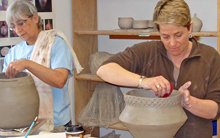Pottery Designer as a Career
 Pottery designer is the best selection of course for creative person who want to work as designers in the ceramics industry. Career development as a pottery designer depends very much on creativity of candidate. Many who seek to establish themselves within the ceramics industry choose to develop a portfolio career, perhaps combining self-employment with other work, such as teaching, arts management, community arts work, or gallery management.
Pottery designer is the best selection of course for creative person who want to work as designers in the ceramics industry. Career development as a pottery designer depends very much on creativity of candidate. Many who seek to establish themselves within the ceramics industry choose to develop a portfolio career, perhaps combining self-employment with other work, such as teaching, arts management, community arts work, or gallery management.
Some designers find that this variety of responsibility helps ember their creativity and drive their inspiration. A pottery designer designs products created through the forming and firing of clay. This involves selecting suitable materials and refining, shaping and firing the design until the end product is created. Products which are made through theses processes are sculptures, ornaments, lamp bases, pots, mugs and many more. In huge organizations, the job of the pottery designer is to interpret the product brief and turn it into a commercially successful design notion.
People who are employed in big companies, career development come from working increasingly with production teams and liaising with external clients. Candidate must grab any opportunities to be inventive. Many times experts are required for research departments. If a person gain experience, then he might be promoted to manage teams of designers within a studio. However, the increase in responsibility will also bring with it the inevitable increase in tasks that are not necessarily design-based.
A pre-entry postgraduate qualification is not required. Potential ceramics designers will require being talented and demonstrating artistic flair; good communication skills; time management and the ability to work to deadlines; organizational ability; photography, IT and computer design skills and craftsmanship and creativity. The course of pottery designer is open to all graduates and Diploma holders. But some subjects may increase candidate's chances to get success in this career. These include-ceramics, art, fine art, art and design and applied design. Candidates are free to choose the subject in which he can develop appropriate practical skills as well as stimulating creativity through evidence of his work which is the major element to get immense success as a pottery designer.
Institutes
- Crawford College of Art & Design, E-mail: kevin.gill@cit.ie. Tel: +353 21 4966777.Course name: B. A. (Honours) in Fine Art/Ceramic Design.
- Sophia Shree Basant Kumar Somani Memorial polytechnic, bhulabhai Desai road, Mumbai -400026.
- National Institute of Design, Paldi, Ahemdabad 380 007, Gujarat.
- Khadi Village and Industries Commission (KVIC) offers certificate course in craft and design - Pottery, Contact: www.ignou.ac.in Email: ignou_kvic@rediffmail.com
- JJ School of Art, Department of Fine Arts, University of Baroda.
- Vinod Dubey of Mitty Studio and Zareen Mistry both teach pottery in Mumbai.
- Ray Meeker and Deborah Smith of Golden Bridge Pottery in Pondicherry. They are pioneers of glazed pottery and have been teaching for past 25 years.
Major work activities:
Pottery designer perform major work to create items which include -designing and overseeing the production of items, including working to a design brief, and client management, preparing clay for use, working on a production by hand or with a mould or potter's wheel, selecting appropriate materials, including bone china which is the strongest and most expensive, hard porcelain ideal for oven to tableware, earthenware and stoneware, preparing, loading and firing kilns, selling wares directly or from a studio, craft/gift shop, art centre, craft market or gallery, preparing work for exhibition, networking to make effective contacts in specialist market, attending courses and training to keep ahead of constant technological, scientific and innovative advances in the industry, and to learn new techniques, inventing and monitoring the worldwide market to ensure products are in demand and practically priced, attending craft fairs and exhibitions, giving live demonstrations of the production of work, taking photographs and producing a catalogue or portfolio of designs for publicity purposes, developing a variety of computer expertise, including website development and desktop publishing (DTP) for publicity materials, collaborating with others in joint work initiatives, such as sharing studio space and being part of a cooperative, developing a clear business plan alongside candidate's artistic objectives, keeping accounts and lists of supplies, applying for grants and awards, and membership of local and national artists' associations and training on ceramics/pottery design modules and running workshops.
If a person prefers this career as self-employment then he can build his career by establishing a reputation and become freer to specialize and experiment. It is highly important to build trustworthiness and it can be achieved through networking, demonstrating work, writing or editing books or articles about work or methods, and speaking about work. Person who are self employed, business knowledge and skills are essential. This training is sometimes included in specialist ceramics courses, but a person has to appoint a business adviser or mentor. It is necessary foe all pottery designers to have good understanding of health and safety issues.